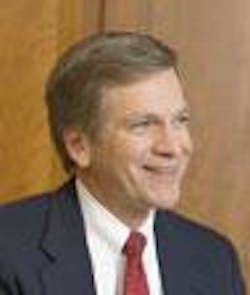Building a world-class finance department
Cris Gaut
Houston
Life at Halliburton the last few years has been a challenge. The urgent has commanded our attention - especially a potentially crippling asbestos liability and a seemingly endless political attack.
But Halliburton has weathered these storms, and now that we have fewer urgent issues to deal with, we can focus more on longer-term matters. At the top of my list is our effort to build a world-class finance organization. The important issues in finance are not unique to Halliburton. Every large corporation faces similar challenges.
First, in todays environment, there is a premium on accuracy, integrity, and control of financial information. Corporate governance is more hands-on. Audit committees are more active, more curious, and more skeptical. There are more people both inside and outside of all publicly traded entities who want more assurances on a greater range of subjects. This is a good thing; it will result in better performance. And it will mean we must raise our individual and collective technical competencies.
Second, as a manager, I want the best people - and that means making a career with Halliburton finance more challenging, more stimulating, and more rewarding. We need to make peoples jobs more valuable to them as we make them more valuable to our company. This need is especially acute at Halliburton, an organization dominated by engineering and operations.
Traditionally, non-engineering disciplines, including finance, have had limitations as avenues for advancement. Historically, good finance people were often looking for ways to jump over to operations or sales, where they saw a better chance to grab the brass ring. We are changing that, so a career in finance can use every ounce of talent and ambition from the best people we can find.
Finally, and most importantly, I want the finance department to do more to help Halliburton management make better decisions. Our finance professionals should be the commercial advisory partner to the operations side of the business - adding value to every decision with a unique analytical product. This means redefining our value at a higher level - and this, in turn, is inseparable from achieving a culture of excellence in the other two areas.
My team outlined a program to achieve these broad goals. We formulated six objectives: develop a rewarding work environment and focus on competency development; engage with our business units to become a trusted business partner; improve transactional processes; ensure effective controls; improve Halliburtons return on capital; and meet or beat our expense budget.
These goals cascade through all the organizations levels. All but the last two apply to every individual. Everyone in our finance organization - nearly 5,000 individuals working in over 100 countries - is required to align his or her personal performance objectives with those of the work group and the departments overall goals. This is done through our People Performance Results annual review system, which includes everyone at Halliburton.
We have taken other first steps along this path. We formed five People Initiative Teams to make finance a more rewarding career. The teams are addressing competencies, recruiting, learning and development, career paths, and succession planning.
To focus on developing our management talent, we formulated a set of transferable leadership competencies in three critical areas: leading through self-awareness, leading through coaching, and leading on a team. These have specific elements that apply to individuals, mid-level managers, and senior executives, and these will be incorporated into the People Performance Results process.
We have begun building a cohesive international finance organization that unites people from every discipline and business unit by opening a finance portal on our intranet. This will be our vehicle for breaking down the silos, building unity of purpose, sharing best practices, recognizing exceptional performance, and helping everyone to be more engaged and more connected. And it will help individuals gain needed exposure to other disciplines, help them grow their skills, and move within the department - for example, from internal audit to project controls.
Our process is open-ended, because our goals are far-reaching. We began with surveys of our own finance people to sharpen our perception of their needs and desires. We will be surveying our internal customers to gauge our progress and help refine our approach. This will be especially important in learning to add more value to the business units. We are measuring everything as we go, in the Halliburton engineering tradition. This is the beginning of a continuing and self-reinforcing process.
Over time, we will see quantifiable results on the three goals - better information, a more rewarding work environment, and more valuable contributions to our business decisions.
And I also expect to see a fundamental culture change in the finance department, as our people broaden their perspective, become more confident, take on larger roles, and their desire and ambition grows. As we grow our people, become a magnet for top talent, and become known as a great place to pursue a finance career, there will be other consequences - like making our people targets for recruiters. But I can learn to live with that. It will be a clear improvement over asbestos litigation.
The author
C. Christopher Cris Gaut has been executive vice president and CFO of Halliburton since March 2003. Before joining Halliburton, he shared the role of president and COO of ENSCO International Inc., a leading offshore drilling contractor. He also served the company as CFO, a position he assumed in 1988. Before joining ENSCO, Gaut was a partner in Pacific Asset Capital. Before that, he held various financial management positions with AmocoCorp. He has an MBA from the Wharton School of Business at the University of Pennsylvania and a bachelors degree in engineering from Dartmouth College.

